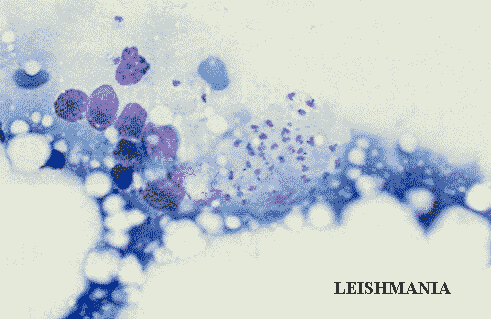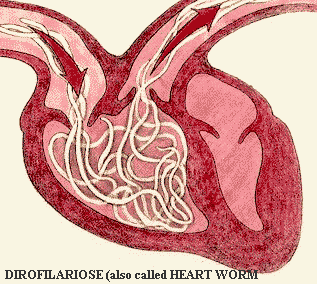The most common parasites :
Babesia canis
is a unicellular parasite which lives in the red blood cells that are destroyed massively.
Leishmania
spreads over the skin and reaches different organs via the blood stream. Sand flies
(phlebotomes) transmit them to dogs

Ehrlichia canis
is a bacteria-like organism that attacks different blood cells. They are carried by
certain types of ticks

Dirofilaria
is also called 'heart worm'. Moskitoes are the vectors of heart worm larvae which
develop inside the heart.


Typical symptoms of these diseases :
Babesiosis (piroplasmosis) : the massive destruction of red blood cells causes anemia and jaundice. A typical sign is the dark greenish urine. The dog is very tired and won't eat.
Leishmaniosis : first symptoms appear several months after infection ; these parasites spread over the dog's skin causing wounds ans sometimes ulcers mainly on the head (around the eyes and the nose) ; lesions are mostly non pruritic and can spread all over the body. Via the blood stream these parasites reach different organs. Other common symptom : diarrhea which ist difficult to treat.
Ehrlichiosis : causing high recurrent fever ; the dog is very weak and anemic ; hemorrhagic diathesis is common, especially in the skin and mucus membranes.
Dirofilariosis : Sand flies transmit the heart worm larvae which reach the heart through the blood stream. The dog has breathing problems and coughs ; blood circulation and tissue oxygenation are poor.
How does the vet do the diagnosis ?
A blood test is necessary ; leishmaniosis can be diagnosed by a fine needle aspiration from a lymph node.
How can I protect my dog against these diseases ?
You have the choice to leave your dog at 'home' (dog pensions, friends...) which would be the safest solution. If you decide to take your dog with you on vacation to a hot country please follow these suggestions :
Heart worm prevention starts at home : either pills or the brand new spot-on application should be started before you leave. Ask your vet for details. Anti-tick collars or sprays give a fairly good protection.
For further questions or in case you see one of the mentioned symptoms in your dog please call your local vet.